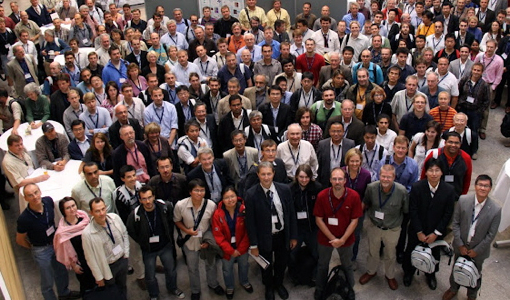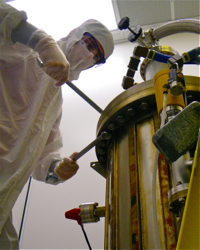09/25/09: 14th International Workshop of RF Superconductivity in Berlin

Group photo during the 14th International Workshop of RF Superconductivity in Berlin, Germany.
We attended the 14th International Workshop of RF Superconductivity in Berlin, German, this week.
April 2009: NSF Early Career Award
Matthias Liepe received a National Science Foundation Early Career Development Award, given periodically to junior faculty members to fund specific research projects. The grants also support educational or outreach programs related to the scientists' research.
Matthias Liepe, assistant professor of physics, received $800,000 over five years to develop an integrated research and educational plan for making advances in superconductivity for particle accelerators. Superconducting radio-frequency cavities are devices found in particle accelerators, including Cornell's planned Energy Recovery Linac, that transfer energy to particle beams as they accelerate. Liepe's research program will look at improving efficiency and power of these devices, and hopefully, spawn a "transformative, broad impact" across accelerator-based sciences. The grant also will fund summer research opportunities for local community college students to encourage them to pursue careers in science, technology or science education.
The Faculty Early Career Development (CAREER) Program is a NSF-wide activity that offers the National Science Foundation's most prestigious awards in support of junior faculty who exemplify the role of teacher-scholars through outstanding research, excellent education and the integration of education and research within the context of the mission of their organizations.
February 2008: Sloan Fellowship
Matthias Liepe has been awarded a fellowship from the Alfred P. Sloan Foundation.
Sloan fellowships are awarded to scientists who show outstanding promise early in their careers of making fundamental contributions to new knowledge, and consist of $50,000 distributed over two years. More than 600 nominations each year are reviewed to arrive at a final selection of 118 fellows.
More News Items

High temperature vacuum furnace for the production of Nb3Sn via vapor diffusion.
